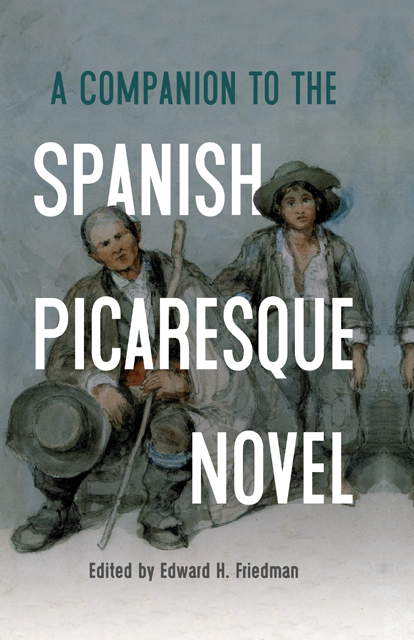Book contents
- Frontmatter
- Contents
- List of Illustrations
- List of Contributors
- Foreword
- 1 The Picaresque as a Genre
- 2 On the Picaresque and Its Origins
- 3 Francisco Delicado, La lozana andaluza
- 4 Lazarillo de Tormes
- 5 Mateo Alemán, Guzmán de Alfarache
- 6 Francisco de Quevedo, La vida del Buscón
- 7 La pícara Justina
- 8 Alonso Jerónimo de Salas Barbadillo, La hija de Celestina
- 9 Miguel de Cervantes and the Picaresque
- 10 Vicente Espinel, Marcos de Obregón
- 11 Carlos García, La desordenada codicia de los bienes agenos
- 12 Estebanillo González
- 13 Critical Approaches to the Picaresque
- 14 The Picaresque in Spanish America
- 15 Continuations: France and England
- 16 The Continuity of the Picaresque: Spain
- Bibliography
- Index
- Tamesis • Companions
4 - Lazarillo de Tormes
Published online by Cambridge University Press: 11 January 2023
- Frontmatter
- Contents
- List of Illustrations
- List of Contributors
- Foreword
- 1 The Picaresque as a Genre
- 2 On the Picaresque and Its Origins
- 3 Francisco Delicado, La lozana andaluza
- 4 Lazarillo de Tormes
- 5 Mateo Alemán, Guzmán de Alfarache
- 6 Francisco de Quevedo, La vida del Buscón
- 7 La pícara Justina
- 8 Alonso Jerónimo de Salas Barbadillo, La hija de Celestina
- 9 Miguel de Cervantes and the Picaresque
- 10 Vicente Espinel, Marcos de Obregón
- 11 Carlos García, La desordenada codicia de los bienes agenos
- 12 Estebanillo González
- 13 Critical Approaches to the Picaresque
- 14 The Picaresque in Spanish America
- 15 Continuations: France and England
- 16 The Continuity of the Picaresque: Spain
- Bibliography
- Index
- Tamesis • Companions
Summary
The many, truly extraordinary innovations of Lazarillo de Tormes have largely been eclipsed by the long shadow of Don Quixote’s fame. Had Miguel de Cervantes’s novel never been, Lazarillo would now be, in all certainty, regarded as the foundation stone of modern Spanish fiction and as one of the foremost originators of the European novel. And although Spanish literary historians have always included it in the Spanish canon, generally speaking it is still unknown outside the Spanish-speaking world. The number of English translations available is decidedly scarce – it is, as of today, not included in the Oxford Classics series, and Penguin Classics published it only in a volume alongside Francisco de Quevedo’s El Buscón. Yet, Lazarillo deserves recognition not only as the first picaresque novel proper but as the central piece in the development of Spanish fiction from Celestina (1499) to Don Quixote (1605, 1615) (cf. J. A. G. Ardila, “The Novel Before Cervantes”). If in discussing the genealogy of Spanish fiction we were to draw a family tree, Lazarillo would be, mutatis mutandis, the grandson of Fernando de Rojas’s Celestina (1499), the son of Francisco Delicado’s La lozana Andaluza (1528), the father of Mateo Alemán’s Guzmán de Alfarache (1599, 1604), and the grandfather of Don Quixote. Had Lazarillo never been published, Guzmán de Alfarache would have never been written, and, in such a hypothetical scenario, Cervantes would have been left bereft of his most direct predecessor.
Lazarillo’s literary accomplishments have always been extolled by Spanish literary historians; it is included in the standard reading lists of schools in Spain and of university degree programs of Spanish worldwide. However, despite the vast quantity of research devoted to it, critical consensus on its aesthetic quality is rarely reached, and some fundamental misconceptions about its aesthetic value still persist in current scholarship. Lazarillo’s complexity is one obvious reason for the dissent amongst critics. It has been consistently misunderstood by literary historians, particularly outside the field of Spanish literature. It is, in the words of Alexander Samson, “a gnomic, opaque and endlessly fascinating work […] too often […] overburdened and overshadowed by modern critical obsessions” (“Lazarillo de Tormes and the Dream” 24).
- Type
- Chapter
- Information
- A Companion to the Spanish Picaresque Novel , pp. 30 - 42Publisher: Boydell & BrewerPrint publication year: 2022



